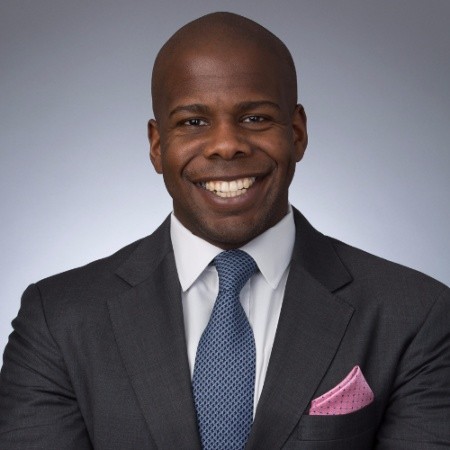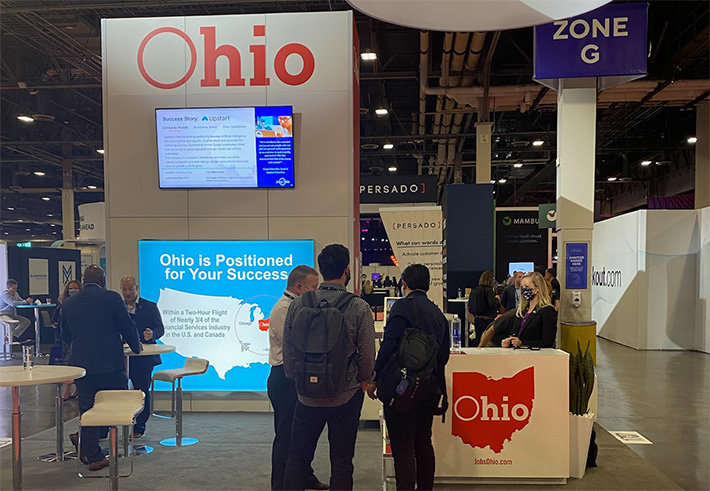Fintech
What Works in Marketing Financial Products
November 17, 2021 Social media was at the top of the list for many marketers that deBanked spoke with, but there are certain formulas necessary to make it work, they say.
Social media was at the top of the list for many marketers that deBanked spoke with, but there are certain formulas necessary to make it work, they say.
“It’s coming up with new ways to say ‘we want to fund your deals,’” said Cassandra Lund, Social Media Manager at Lendini, when asked what the hardest part of her job is. Being heavily involved in the marketing campaigns of a large small business funding company, Lund believes social media is a prime place for setting up brand legitimacy.
“[Social media] provides something that even other forms of marketing cannot,” said Lund. “It instantly connects you to your audience and allows them to ask questions right away, either through direct message or as a comment.”
Fintech companies are also strategically using social media to start getting their name out there. Jennifer Marshall, Marketing Manager at fraud and dispute software provider Quavo, praised the power of social media; especially platforms that provide a professional environment for both consumers and businesses.
“We see the most results on LinkedIn,” said Marshall, “from both paid and organic efforts. “LinkedIn can take [businesses] a long way if their marketing team leverages tagging and mentioning [on the platform]. In the early stages of a company, when brand awareness is the top priority, [businesses] should leverage their employees’ LinkedIn networks.”
 While Marshall and Lund are marketing different financial products, they both agree on the inherent value of LinkedIn to their respective companies when it comes to a buttoned-up platform for connections and content.
While Marshall and Lund are marketing different financial products, they both agree on the inherent value of LinkedIn to their respective companies when it comes to a buttoned-up platform for connections and content.
“Just create a Linkedin and Instagram and start posting,” Lund said, when asked how a business could get their foot in the social media door. “You will find people in your industry, potential clients and information about what other businesses in your field are doing. Build out from there, and your business will thank you for it.”
With the opportunity social media provides comes responsibility, and some companies have let simple mistakes hurt the perception of their brand. Lund and Marshall both believe that a misguided or typo-littered social media presence can do a company more harm than good.
“Spelling errors and bad graphics, I see these [errors] a lot on social media as it becomes more and more important to small businesses,” said Lund. “There is nothing more important on social media than a first impression, and a spelling error or hugely pixelated photos is a major deterrent.”
Marshall stressed that companies not let “B2B vs B2C” marketing practices dictate their social media efforts. “In the end, you should want to reach people where they work and where they play. Once you understand that, the value of social media to all financial companies is crystal clear.”
 With new members of the work force living most of their lives ingrained in social media, it appears its value in the business world is exponential. “The younger generations have used it for years, or since being born, and it’s not going anywhere in the near future,” said Lund. “Finding new clients, new customers and like-minded business professionals on [social media] helps build your brand and stake a claim in the industry. Anyone that doesn’t think social media is important in business in general is missing out.”
With new members of the work force living most of their lives ingrained in social media, it appears its value in the business world is exponential. “The younger generations have used it for years, or since being born, and it’s not going anywhere in the near future,” said Lund. “Finding new clients, new customers and like-minded business professionals on [social media] helps build your brand and stake a claim in the industry. Anyone that doesn’t think social media is important in business in general is missing out.”
Marketing financial products, especially new or alternative fintech solutions can be difficult, however. When asked about how to market a financial product, Francesca Ligouri, Lead National Designer at Create with Chess, a national marketing company that works in a variety of industries, spoke about the values of traditional marketing materials on top of social media. She stressed the importance of putting a tangible item that explains your business model in the hands of a potential customer that may not fully understand the product being sold to them.
Ligouri spoke about networking materials, and how sometimes the explanation of a product is best done through tangible imagery.
“It’s about using infographics and icons [to help] create a storyline of what you’re trying to say, while keeping your demographic engaged,” said Ligouri. “Illustrative materials like brochures, folders, and mailers make people want to pick up your collateral and be like ‘oh cool, what is this all about?’ instead of printing a word document of all your info and expecting people to want to read through it.”
Whether it is printed or digital materials, innovation in finance isn’t just about the technology behind the products themselves, but also about how those brands and their products are introduced to potential customers.
Mortgage Fintech CEO says Brokers are Still Relevant to Lending Process
November 12, 2021
At Money 20/20 last month, deBanked spoke with Jason Harris, CEO of Button Finance, about his company’s initiative to give access to home equity loans to borrowers that would have never been able to do so. Through this conversation, Harris also shared his thoughts on how brokers across the finance world are still relevant, and the ones who are embracing tech are the ones who are closing deals.
Button Finance is a fintech company that brings together venture and hedge fund capital with borrowers seeking lines of home equity credit. After moving into second-lien mortgages, Button Finance is looking to open up a practice which according to Harris, is mostly an exclusive borrowing process for high net worth clients who borrow from large institutions.
“The reason we like this product is because if you’re an individual, you have to go somewhere like LendingClub or to your credit card to borrow money. And those are interest rates at 20%, as high as 30%, even if you have great credit, it can be over 10%. So we want to give people a much lower cost for access to credit.”
Harris also has a desire to make the process as quick and efficient as technology allows. He is embracing not only expanding the access to capital, but making the process to obtain it simple.
“We want to make it so you can borrow money sitting on the toilet on your phone,” Harris said.
When speaking about brokers in his industry, Harris touched on how the ones who are innovating are taking advantage of such a unique time, where the amount individuals innovating are relatively low, and the opportunities given by the innovation have never been higher.
While some companies offer a completely broker-less buying process, Harris thinks the role of a broker is necessary for a borrower of any loan to be comfortable and informed during the borrowing process.
“Now with regards to the need for brokers, this is something that now happens very often,” said Harris. “When people make large purchases, they like the comfort of speaking to someone and having someone advise them. Sometimes a broker can offer you some educational knowledge. We’re in the finance world; if you’re not a finance person at all, before you borrow $500,000, you might want someone advising you along the way.”
“Different brokers have different ways of brokering,” said Harris. “Some brokers spend money and build out great technology platforms themselves, and they’re able to scale and do ten times as many mortgages as a broker who is doing high touch [business]. Other brokers will use relationship based lending and have high touch [business]. I think it’s definitely going more towards the technology route.”
While embracing the value tech has, Harris realizes that with all this technology comes a responsibility to educate borrowers on all the different processes that are changing when it comes to data transfer, verification, and approval processes. “Like every other tech company, we want to try to bring technology to this as much as possible. We want to be able to advise a borrower on the best possible product just using technology.”
While speaking specifically about the innovation the financial world is experiencing, Harris thinks that a drastic change to the finance world will be take place over a long period of time.
“Like everything, things move slowly,” said Harris. “Don’t think this will happen overnight.”
Marcus By Goldman Sachs Will Become Goldman Sachs Marcus
November 12, 2021 Brace yourself for the craziest rebrand in fintech history.
Brace yourself for the craziest rebrand in fintech history.
Just kidding.
Marcus by Goldman Sachs is changing its name to Goldman Sachs Marcus.
:::Mind Blown:::
The news, publicized by Forbes, said that the bank now feels more confident in leading the division with its own name first after initially applying caution.
Goldman found that their customers had a strong brand affinity with the name ‘Goldman Sachs’ and wanted to “be closer to the brand,” said Stephanie Cohen, Goldman’s Global Co-Head of Consumer and Wealth Management.
The full scoop can be read at Forbes.
Wall Street Banker Turned Fintech CEO Builds Two-in-One App For Underserved Communities
November 10, 2021 Andrew Glaze, CEO of Wealthstack, shared his thoughts with deBanked on the role fintech is playing in bringing innovation to minority communities. While actively working in the financial world and spreading awareness about the diversity issues in the field, Glaze hopes to share his story so that those in similar situations as he was know that there is a chance to achieve profound financial literacy.
Andrew Glaze, CEO of Wealthstack, shared his thoughts with deBanked on the role fintech is playing in bringing innovation to minority communities. While actively working in the financial world and spreading awareness about the diversity issues in the field, Glaze hopes to share his story so that those in similar situations as he was know that there is a chance to achieve profound financial literacy.
According to Glaze, Wealthstack is mainly a digital investment platform designed to teach diverse and underserved communities how to invest. These communities include African American, Hispanic, Asian, and veterans.
As a Jamaican immigrant, Glaze went from sleeping in a two bedroom apartment with twelve people as a child, to climbing through the financial world. According to him, he now manages over a billion dollars of capital between all of his financial endeavors.
“In Bed Stuy, I saw a lot of impoverished, poor, good and noble people who would never have the opportunity to create wealth for themselves,” said Glaze, when asked about what Wealthstack was all about. “So I created a platform that allows me to leverage my expertise and experience, and recognize the training tools within it. There’s a number of training platforms out there and there’s a few educational platforms out there, this is both.”
As a West Point and Columbia Business School graduate, he made his way through Wall Street as a banker and then a hedge fund manager. He now wants to use his adversity ridden story to provide an opportunity for those that grew up in the similar conditions he did, putting together an effort to provide a fair chance for the underserved at being financially successful.
Wealthstack users will get the education and real world practicality out of the mobile app, and they will soon be able to invest directly on the platform after they learn about what each type of investment is.
“We do a series of two to four minute videos that cover everything from the very basics of what is a credit score is, all the way up to how to value businesses based on cash flow. There’s over one hundred videos on the platform today, each video features diverse actors, so you’re able to see people that look like you.”
When asked about the biggest issue facing underserved communities, Glaze discussed access to capital as one of the things that over time, has not caught up with other bias practices being weeded out.
“I’m in a unique position as an African American veteran immigrant, and also senior financial professional, who serves on boards. I’m evaluating $500 million loans for $2 billion businesses that I’m on the board of, but then also going out and personally applying for credit at different points of time. I am very familiar with the challenges that are faced due to inherent bias.”
Although Glaze said that things changed a lot over the past hundred years when it comes to underserved communities having wealth, he thinks lending is lagging behind. “I will tell you that that same spirit of resentment against offering capital to people that don’t look like you certainly is alive and well today. And it manifests in a number of different ways.”
Upstart is Heading into Small Business Lending
November 10, 2021 Upstart, the fintech AI consumer lender originally known for its student loan platform, is heading into small business lending.
Upstart, the fintech AI consumer lender originally known for its student loan platform, is heading into small business lending.
“…we believe there is an unmet need to provide fast, easy access to affordable installment loans to business owners across the country,” said Upstart CEO David Girouard during the earnings call. “Every small business is different and they operate across a crazy wide spectrum of industries.”
Girouard explained that there are “significant challenges to delivering a compelling loan product that is useful to business owners,” in which there is also reliable value for the lender itself.
“This challenge is tailor-made for Upstart,” Girouard said. “While there is no shortage of credit options to business owners, we aim to deliver the zero-latency affordable credit solution that modern businesses require. This is another product in high demand from our bank and credit union partners, and we hope to bring it to market during 2022 as well.”
Upstart is no small player. The company’s market cap is currently around $20B and it is putting out about 1.5M loans a year for a total of more than $16B.
Ireland is Funding Fintech Through Government Investment
November 2, 2021 The Irish government has taken a serious liking to fintech. With a broad history of being active in financial services, the nation believes they can attract companies from around the world to reap the benefits of employing Irish citizens, while also tapping a major source of export revenue through an up-and-coming industry.
The Irish government has taken a serious liking to fintech. With a broad history of being active in financial services, the nation believes they can attract companies from around the world to reap the benefits of employing Irish citizens, while also tapping a major source of export revenue through an up-and-coming industry.
With access to capital for small businesses just as difficult here as it is in the US, a new fintech company looking for start-up cash may be able to turn to Dublin to get a major investment, rather than dealing with a retail investor or a venture capital firm here in the states. Enterprise Ireland, the organzation that runs these programs, is trying to tempt fintech companies looking for a fresh start or an international expansion to start that process in Ireland.
“Enterprise Ireland is the trade development and venture capital arm of the Irish Government,” said Claire Verville, Senior Vice President of Fintech and Financial Services at Enterprise Ireland. “We are a semi state agency and our mandate is to help support indigenous Irish enterprise to grow and expand in global markets.”
Just like in the United States, it is extremely difficult for an Irish business to walk into a big bank and get a loan. It’s in these situations where the Irish government has decided to make a direct investment themselves. Through Enterprise Ireland, according to Verville, the Irish government can provide capital to startups across a range of areas, in exchange for things like loan repayment or government equity in the company.
“In addition to the kind of more traditional trade development stuff that you would see from any government promoting their indigenous businesses abroad, we do invest directly in companies through equity and participate directly as a [limited partner] in funds to funds.”
Verville spoke about how the Irish government has been looking to extend funding to fintech startups for some time. “Our fintech portfolio is over 200 companies now, we have been one of the most active investors in Europe in a long time. We are one of the most active global investors across all sectors, and we’re really focused on early stage capital for fintech.”
 When asked about the decision making process that goes into Irish investments, Verville portrayed it the same as if it was a private firm making the same move. “We will vet like any other investment, make sure we’re comfortable with it, make sure that the business is verifiable, and that we understand the track record of the team,” she said.
When asked about the decision making process that goes into Irish investments, Verville portrayed it the same as if it was a private firm making the same move. “We will vet like any other investment, make sure we’re comfortable with it, make sure that the business is verifiable, and that we understand the track record of the team,” she said.
Through investing in fintech, Enterprise Ireland appears to believe they will give their small business owners better access to capital. If the industry can create a Euro-American hub in Ireland, the latest tech and funding innovations will develop there, giving access to that technology to Irish businesses first. If Irish small business lenders can use Irish technology to help an Irish merchant, everyone wins.
With financial innovation in Europe being leaps ahead of the US, Verville believes the Irish employees working in finance would be better suited to deal with some of these new innovations over Americans because of their familiarity with these systems that are already in place. She hinted at things like EMV cards being around in Ireland for years at the consumer level before they ever made it to the United States.
As far as incentive for profit, Enterprise Ireland isn’t concerned with the success of their investment from a financial perspective as other investment groups are. They instead focus on things like employment numbers and longterm sustainability for those jobs acquired through their efforts in investing in industries like fintech.
“Because we are attached to the government, we aren’t a money-making mission as far as venture capitalists go. We are focused on employment in Ireland, which is partly why it’s so important that the companies are founded in Ireland and that they are building their employee base in Ireland, and on export revenue.”
Verville spoke about how only when businesses in Ireland do well, Enterprise Ireland only does well, too. “We do make money off some of our investments, and that’s government money. We get our budget set by the government department every year, just like any other government agency.”
To be eligible for funding from Enterprise Ireland, a business needs to be based in Ireland, have an Irish LLC, and must have a significant amount of Irish employees. According to Verville, the Irish market is ripe for American small businesses, especially alternative finance.
Five Takeaways from Money 20/20
November 1, 2021
I attended Money 20/20 in Las Vegas last week and spoke directly with the people trying to push innovation through the financial world. Whether it’s payment processing, cryptocurrency, cyber security, data entry software, credit card issuing, or lending processes, millennials with impressive resumes are looking to trim the fat from the financial world with their beloved software.
Below are five takeaways I got from attending Money 20/20.
Crypto is Legit- If you’re still thinking crypto has no value, you’re being naive. The crypto space at Money 20/20 was dominated by international transaction companies, crypto conversion companies, crypto investment companies, and even some doing business lending with crypto. These booths had the most energy around them, and there seems to be general excitement from all the groups about the industry. The crypto community is no longer young kids with big ideas, but legitimate investors and money-people that have an unprecedented amount of interest in investing outside of the US dollar.
The Payments Pool is Overflowing- There are hundreds of companies that are competing to carry your dollars from your wallet to a merchant while taking micro-transactions off the top. These companies are competing heavily, and at Money 20/20, there was no end in sight to them. After a while it got exhausting trying to figure out how one differentiated from another. Is there really any room for MORE innovation or have all the bases been covered already?
Innovation is Blind- A massive amount of innovation is being pitched at these events for types of tasks regarding data collection and entry. The thing is, some software writers themselves have no idea how the industries they are innovating currently work. Software developers from major companies told me they had never heard of a loan broker, as they were pitching software that allows merchants to go directly to the lender for an approval on a business loan. How can something be innovated without the innovator knowing what they’re innovating?
Cybersecurity Seems Light- Cybersecurity had a smaller presence than some of the other major categories. One would think that every fintech company would also need strong cybersecurity. Either cybersecurity is going to be dominated by a small group of players or there is a huge opportunity here that is still untapped.
Networking’s Value is Priceless- After doing virtual business for almost two years, the value of a face-to-face meeting with a potential business partner is well worth the price of admission for the attendees. The people I spoke with said that just to have the ability to get thirty minutes at a table with someone was why they were attending. The connections lounge was the most populated place at the event all three days, as companies from across the globe were finally able to converse without a video camera. Believe it or not, people across the financial world have really gotten sick of Zoom.
Ohio Sends State Reps to Vegas to Pitch Fintech Companies
October 28, 2021 As brokers, lenders, and fintech companies look into having offices outside of New York or California now more than ever before, the state of Ohio used Money 20/20 to pitch their state as the best home for any company dealing with money or the innovations surrounding it.
As brokers, lenders, and fintech companies look into having offices outside of New York or California now more than ever before, the state of Ohio used Money 20/20 to pitch their state as the best home for any company dealing with money or the innovations surrounding it.
With Ohio’s lack of a state-level corporate income tax, relatively low rent, and modest wages compared to places like New York, headquartering in the state is a business decision that Terry Gore, Senior Director of Financial Services in Fintech for Jobs Ohio, referred to as a “no brainer.”
“I’ve been coming to this event for the last four years, the organization probably the last five or six years, and we think we have a very unique value proposition for the audience this year,” said Gore. That [proposition] is fintech, insurtech, in terms of the ecosystem that we have in Ohio, and using that to support their continued growth and expansion.”
Gore broke the pitch down into three main components about why Ohio is the most economically sensible state to headquarter a company in.
“We’re ranked in the top three in terms of headquartered banks and insurance companies, and we’re the fifth largest final services sector in the US market, so from a potential partner standpoint, I think we’ve checked that box.”
 He went on to stress the access to higher education that Ohioans have, arguing that their talent pool is right up there with that of New York and California.
He went on to stress the access to higher education that Ohioans have, arguing that their talent pool is right up there with that of New York and California.
“Most people don’t know, just from a number of citizens’ perspective, we’ve got just under twelve million, we have talent,” said Gore. “We’ve got over 200 colleges and universities, from a talent pool perspective, those companies could tap into that.”
The final component Gore stressed was Ohio’s geography. Nestled in between New York and Chicago, he described it as the perfect place for a company that does a wide array of business across the heartland and the coasts to call home.
“We’re in the eastern standard time zone, we’re just a short two hour flight from three quarters of the financial centers in North America. So you know it’s one of those things where you don’t have to be located in New York to be able to drum up business in New York, you can just literally have a day trip and work that market.”
Ohio has already become a home for major players in the fintech world with companies like Klarna and AllianceData already hosting their headquarters in the state.
“We’ve been able to attract California based companies like Upstart, who moved into central Ohio and opened up their second headquarters, which is now larger than their California based location,” Gore said.
In the midst of their efforts to express all the benefits their state offers, Gore admitted that perception of his state to the rest of the country has a major influence on the decision making that goes into doing business there.
“We want to be viewed more traditionally than what the state has been viewed as, and that’s pretty much focused on manufacturing or a fly-over state. If you’re going to complain about the weather, I can’t help you.”





























